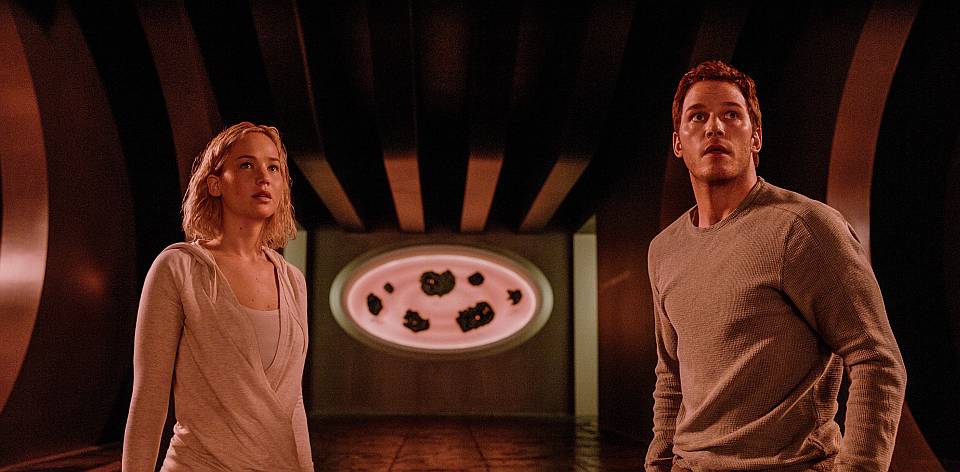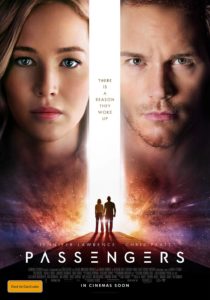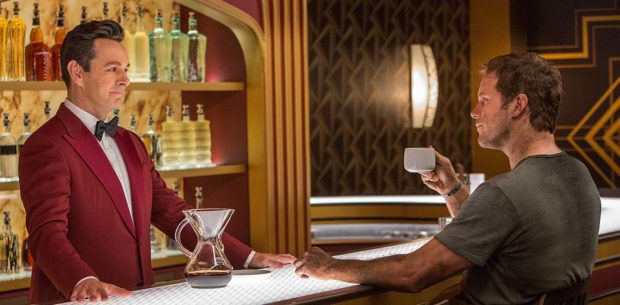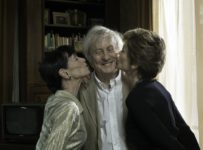The first thing you notice about PASSENGERS, as the elegantly designed starship Avalon glides through deep space, is just how pretty it is. Which is where director Morten Tydlum (The Imitation Game) is most at ease in this big-budget two-hander, rarely stepping outside the comfort of sci-fi aesthetics. Yet he and writer Jon Spaihts guide the ship safely into formula, it’s hard to completely dislike a film that enjoys its own visuals (both the human and set design kind) as much as this does.
The aforementioned ship is transporting 5000 hibernating passengers on a 120 year journey to the planet Homestead II. However, when a malfunction occurs, lone mechanical engineer Jim Preston (Chris Pratt) is woken up 90 years early. Unable to return to sleep, he spends a year with only the robotic bartender Arthur (Michael Sheen) for company. Wrestling with his conscience, he awakens writer Aurora Lane (Jennifer Lawrence) to join him, knowing full well that she will share his fate of dying before they reach their destination.
PASSENGERS is a troubled film. If you put aside for one moment the creepy levels of manipulative control central to Pratt’s character – something that the film’s heavy-handed romanticism and sexy shopfront make it easy to do for a while – we’re still left with a tone that lurches about as erratically as the malfunctioning vessel. The presence of Sheen’s Arthur is a visual nod to The Shining, a comparison that’s hard to avoid when you have a writer isolated in a strange hotel. Yet where that classic film chose murderous rage as a musing on masculinity and sexism, Tydlum and Spaihts fully embrace the marketability of both to a young adult audience.
All of which is a shame given how likeable Pratt is as a lead, with the first act vaguely reminiscent of something out of Duncan Jones’ Moon. The camera loves Lawrence, perhaps a little too much, as the character spends much of her time in bathing suits or running pants until action is required of her. Rodrigo Prieto’s (Silence) impeccable photography, mixed with pristine CG environments, festishises the people, places and things. At its best, such as a tense underwater anti-gravity sequence, the film is a feast for the eyes. Even so, the “accidental happiness” and chemistry the characters find only briefly gives way to interpersonal tension, a genuine missed opportunity to make this something more intently sinister and play against both of the lead’s types.
The cogs of drama and a deus ex machina force the star-crossed lovers together again, while the plot falls back on running, manual overrides and instant gratification. It’s here that you can most feel some kind of creative crisis, surely the result of a panicked change of heart about the direction of the allegedly much darker ending. There is a fine film at the heart of PASSENGERS, several of them in fact, and it only needed a little nudge in one of several directions to find its sweet spot. So even with these misgivings, and multiple dips into the pop cultural well (think Gravity meets 2001), there’s something there to enjoy if you don’t think about it too hard.
[stextbox id=”grey” bgcolor=”F2F2F2″ mleft=”5″ mright=”5″ image=”null”]2016 | US | DIR: Morten Tydlum | WRITER: Jon Spaihts | CAST: Chris Pratt, Jennifer Lawrence, Michael Sheen | DISTRIBUTOR: Roadshow Films (AUS) | RUNNING TIME: 116 minutes | RELEASE DATE: 1 January 2017 (AUS), 21 December 2016 (US) [/stextbox]






